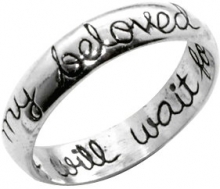
I was all set to post something else today. I’d even finished writing it yesterday. Now it’s going to have to wait until tomorrow, because yesterday I read this great post over on From Two to One.
I think I should let Danielle’s words speak for themselves, in part because (and this is not a criticism) she’s younger than I am and entered into her relationship and marriage with her husband after Joshua Harris’ book was published. I got married the same year the book was released and it was entirely irrelevant to my life because I had been in a relationship and then engaged before the book came out. However, I will note that I’m not a fan of Harris or his notions about relationships.
That said, what really struck me in Danielle’s post was this:
The most important factor in the distinction between Jessica and Libby’s views on this second point – that you shouldn’t necessarily date unless it could potentially lead to marriage – is context. In Jessica’s case, she was raised in a predominantly Catholic home, which despite the Catholic Church’s frenzy over contraception and abortion, is way less obsessed with purity culture. Jessica also did not date in her high school and much of her college years. In contrast, Libby grew up in a family and community heavily influenced by the purity, Christian patriarchy, religious right, and related movements.
Yes. That, right there, is an important distinction. (I believe this is significant beyond the realm of dating, love, sex, and marriage, but that’s a topic for a whole other blog post.) For those who had their religious formation in a restrictive environment and then removed themselves from that world, Harris’ book is likely to bring up a whole lot of feelings. Even for people like me it can induce strong reactions, in part because I had no exposure to that culture until well into adulthood—and quickly discovered that it was not for me.
I was a parent before I even heard of such a thing as “purity culture.” I knew of exactly two people during my high school and college years who believed in a sort of magical soul-mate non-dating type of relationship. Both of them were certain that the man God had ordained for them would one day appear, à la Snow White’s “Someday, My Prince Will Come.” I am not exaggerating at all when I say that one friend believed she and her future husband would gaze into each other’s eyes and just know they were meant to be.
Other than that, I had “purity training lite.” I learned in my first church that I was not supposed to have sex before I was married, but that was about it. My first church was much more hostile toward gay people than toward dating couples. I had no idea that there was such a thing as purity rings, purity balls, or parent-arranged/parent-approved courtship. After I got married, I heard about Harris’ book, of course, but dismissed it as irrelevant and never read it. It wasn’t until after my daughter was born that I learned the rest existed and that there was a whole culture surrounding it.
For that reason, I can easily dismiss Harris and his ilk. I don’t have to rebel against an entire culture in which I was raised. I don’t have to assert my sexual liberation or rail against the idea of “falling into sexual sin.” I’m free to agree with anything that might be of value in those books, while rejecting anything that is inappropriately restrictive. I’m even free to toss the whole thing out the window and find better sources for relationship ethics. My children are free to do the same.
But for those who have been wounded by that culture, it’s not so simple. They’ve seen the damage that can be done at the hands of parents, pastors, and teachers who demand compliance with Harris’ ideas. They see people still suffering in oppressive religious environments and they want to set them free. Sometimes that comes out in healthy ways; sometimes it doesn’t.
Ultimately, what I took away from Danielle’s post is that I could stand to be more generous myself. I need to be willing to consider carefully whether it’s the message or the packaging that I don’t like. Danielle seems to have been able to do exactly that in her own reading of Harris’ book, and she seems to have been capable of forging her own path as a Christian feminist. I think that’s a life story we can all learn from.



